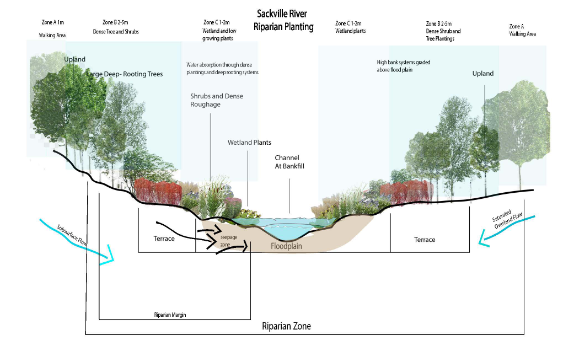News
» Go to news mainEmbracing unexpected opportunities

By Anastasiia Merkureva ╠²
Kai King's path to success centers on embracing unexpected opportunities. From meeting landscape architecture visionaries to exploring M─üori influence on the industry in New Zealand, King reflects on how openness to experiences has shaped their path.
Initially aiming for a career in medicine, King earned a bachelorŌĆÖs degree in Neuroscience from Memorial University of Newfoundland. After graduating, he traveled across North America and worked on farms. This journey led him to an organic farm in Newfoundland, near a landscaping company where he was later hired as a master grower. There, he discovered a passion for landscaping after meeting a landscape architect.
ŌĆ£It was an organic melding of two parts of myself that allowed me to be creative and do research.ŌĆØ
They wanted to continue to work with coastal landscapes and local plants, so they decided to find a university within the Atlantic provinces. The Landscape Architecture program at ┬ķČ╣┤½├Į was a perfect fit.
ŌĆ£┬ķČ╣┤½├Į has been really great in showing me the business side of things,ŌĆØ they said. ŌĆ£I've created beautiful connections with instructors Tracy McKenzie, Karen Smith, Ed Versteeg, Corey Dawson, Rick LeBrasseur - all those people have helped me figure out what I'm passionate about in this field.ŌĆØ
King loved the studio courses, as they allowed him to implement knowledge through problem-solving design. He was particularly proud of two projects.
ŌĆ£We designed a flood mitigation strategy for the Sackville River, following the flooding issues they had last year,ŌĆØ they said. ŌĆ£That felt pertinent, something that could have a huge impact.ŌĆØ
 The other project focused on land restoration and indigenous design. King was one of the few ┬ķČ╣┤½├Į indigenous students who took a trip to New Zealand to study the way M─üori culture is represented through the university of Wellington. He took the opportunity to connect with M─üori landscape architects.
The other project focused on land restoration and indigenous design. King was one of the few ┬ķČ╣┤½├Į indigenous students who took a trip to New Zealand to study the way M─üori culture is represented through the university of Wellington. He took the opportunity to connect with M─üori landscape architects.
King reflected on how their Qalipu MiŌĆÖkmaq identity influenced the way they worked on projects.
ŌĆ£Generally, we see the world as having multiple different parts that all work together towards one greater goal,ŌĆØ they said. ŌĆ£I think a lot of landscape architects are constantly thinking about how they can improve the world. And although your design caters towards someone who's elderly, for example, or someone who's disabled, that design will actually impact a bunch of other people positively.ŌĆØ
Ed Versteeg echoed KingŌĆÖs words, commenting on one of his studentŌĆÖs projects:
ŌĆ£In his final design course, Kai set out an exciting vision for the renewal of a local townŌĆÖs main street. His work celebrated the unique mining history of the community, created inclusive and accessible public spaces for all people, and provided ways to reduce the impacts of urban run-off on the local river. KaiŌĆÖs work shows how landscape architecture can help create dynamic and sustainable settlements.ŌĆØ
After graduation, King plans to continue their education at the University of Toronto. They made this decision after connecting with Claude Cormier, a celebrated Canadian landscape architect, after his lecture at ┬ķČ╣┤½├Į in 2022.
ŌĆ£He talked about landscape architecture with such passion and creativity. He pushed the boundaries of what landscapes mean,ŌĆØ said King. ŌĆ£He had encouraged me to get my master's at the University of Toronto because it would help me to build my creativity and to network with people who were similarŌĆ” After he passed away, I kind of felt like it was serendipitous.ŌĆØ
CormierŌĆÖs vision, the guidance of ┬ķČ╣┤½├ĮŌĆÖs instructors, and learning through community-improvement projects shaped what kind of professional King wants to become.
ŌĆ£I have a good foundation, but I really want to be able to bring all of that forward in a way that's really impactful and meaningful on a large scale to indigenous people, to queer people ŌĆö to people who are underrepresented in our society.ŌĆØ
He encouraged future students of Landscape Architecture to say yes to the opportunities, network, be curious about other peopleŌĆÖs passions, and not be shy to show their authentic selves.
ŌĆ£I think that being someone who is neurodivergent and/or a part of the queer community, and returning to university as a mature student, it can be difficult to open up to other students,ŌĆØ they shared. ŌĆ£I am shy and was afraid to show my authentic self because I thought I wouldn't be accepted. There's this idea around small farming communities such as Truro being really conservative, but people were a lot more accepting and supportive than I had thought. There's a community of people who will back you up, support you, and be really proud to see you grow and flourish as your most authentic self.ŌĆØ
Congratulations ╠²
Recent News
- Engineering Excellence: Students triumph at Atlantic competition, earn National silver
- Dal AC International expands global learning with GSO funding
- Engaging with the African Nova Scotian Community
- The Dal AC International Guest House is Now Open!
- Finding Balance and Success in Engineering and Athletics
- International conference on Canadian agriŌĆæfood & rural advisory, extension and education
- BCDI Canadian International Development Scholarships
- Dal student places second at Innovation Challenge
